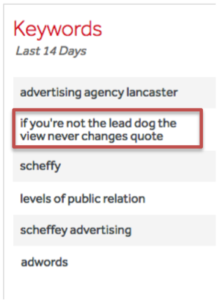The Power of the Blog (Part 1)

We recommend a lot of strategies here at Scheffey, always tied to tangible business goals. Like your financial portfolio, utilizing a variety of tactics works toward a healthy brand.
But one digital tactic I almost always recommend is having (and effectively using) a blog.
Blogs have been around for a few years now, and they have evolved from their humble “web log” beginnings to a powerful tool for businesses to find and directly address their target audiences. Now, companies that know how to blog effectively can expect more web traffic, more leads, and more customers.
WHY BLOGGING SHOULD BE A PART OF YOUR DIGITAL MARKETING
Search engines love it
The priority of your blog is to speak to your visitors about topics that relate to your business and that are interesting to your target audience. A happy byproduct of this is that you can add search-friendly keywords, and you can start establishing topic authority on your site.
The combination of your audience seeking, finding, and reading your site increases your brand’s ability to rank higher for your top keywords or service topics.
For example, our client, Indoor City, is an authority on luxury flooring, including hardwood, exotic hardwood, and engineered hardwood. While Indoor City has a hardwood flooring product page, they also have several blog articles that provide more details about hardwood: its durability, hardwood trends, and differences between engineered and solid hardwood.
When I conducted a site search via Google, guess which pages the search engine giant deemed most authoritative on the subject of hardwood?
 The blog!
The blog!
When I searched indoorcity.com for hardwood, Google guessed I’d want to know everything about my query. So, the first 6 answers it provided was in-depth information about hardwood. The 7th listing was the hardwood product page.
Now, my results could be a bit skewed: search algorithms are constantly trying to “learn” about what I like to do online, and I like to read blogs. But then again, so do 77% of internet users.
Search engines show the love for years
One of the best features of blogs is their long-term, compounding value. Blog articles are indexed by search engines from the moment you write them to the moment you delete them. This means you continue to amass credibility and keywords on a particular subject the more you write about them.
Take our blog: our fearless leader – Scott Scheffey – used a common phrase as a title of his blog article back in 2012. “If you’re not the lead dog, the view never changes.” It’s a popular phrase, so people continue to search for the idiom on Google. Scott’s blog appears on the first results page.
Our on-site analytics periodically show the phrase is a contributingkeyword to our website.

Obviously we like it when more strategic keywords contribute to our web traffic, but we get a kick out of it when this blog surges in interest again.
But think about what this means for your company: blog articles you wrote back in 2012 can contribute significantly to today’s traffic. The key is to use your blog effectively to talk about a variety of topics related to your areas of expertise so each post can build on articles written days, months, or years prior. This work builds gravity to your site, using content to draw customers to it.
Audiences click it
Your customer will click on articles that might answer a question, solve a problem, or teach him/her something helpful.
We know from watching search trends that people take to sites like Google or Yahoo or Bing with a question on their minds, or a problem they want to solve. You can attempt to directly answer these questions or challenges by writing about them on your blog. You can demonstrate you understand their need, tell them how you can help, what kind of impact they can expect, and how your product or service will benefit them.
Blogging also gives you a chance to speak to any issues or questions that cause friction in your buying process. You can use a blog to address concerns that usually stop or pause a purchase, such as “how does this product compare to others like it?”, “what kind of support can I expect?”, and “what should I consider before purchasing?”
Blogs work
Let me hit you with a few stats here:
Companies that blog, on average, have 55% more visitors, 97% more inbound links, and 434% more indexed pages. Source: Hubspot
B2B marketers who use blogs generate 67% more leads per month than those who do not. Source: FactBrowser
57% of companies with a blog have acquired a customer from their blog. Source: Hubspot
Keep in mind: you do not need to continuously churn out content so people can research topics for free. That’s why Wikipedia exists.
Make your blog WORK for you as an extension of your sales or marketing team by creating effective posts that drive a specific audience to take action. In The Power of Blogging (Part 2), I’ll be talking about how businesses can blog effectively, giving some best practices, as well as a strategy for how to approach your blog. Stay tuned over the coming months to learn more! Or, contact us directly for a one-on-one analysis of your website, audience, and blog potential, and start talking directly to your target audience now.
